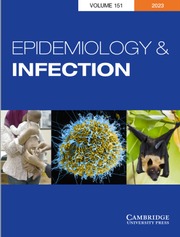Crossref Citations
This article has been cited by the following publications. This list is generated based on data provided by Crossref.
BENNETT, M.
BAXBY, D.
GASKELL, R. M.
GASKELL, C. J.
and
KELLY, D. F.
1985.
The laboratory diagnosis of Orthopoxvirus infection in the domestic cat.
Journal of Small Animal Practice,
Vol. 26,
Issue. 11,
p.
653.
1989.
The Orthopoxviruses.
p.
377.
Munz, E.
Linckh, S.
and
Renner‐Müller, I. C. E.
1992.
Infektionen mit originärem Kuhpockenvirus und kuhpockenähnlichen Erregern bei Mensch und Tier: Eine Literaturübersicht.
Journal of Veterinary Medicine, Series B,
Vol. 39,
Issue. 1-10,
p.
209.
Crouch, A. C.
Baxby, D.
McCracken, C. M.
Gaskell, R. M.
and
Bennett, M.
1995.
Serological evidence for the reservoir hosts of cowpox virus in British wildlife.
Epidemiology and Infection,
Vol. 115,
Issue. 1,
p.
185.
Kannangai, Rajesh
Finny, G. Joseph
John, T. Jacob
Sridharan, Gopalan
and
Gopal, Robin
2000.
Vaccinia reactive antibodies in a south Indian population.
Journal of Medical Virology,
Vol. 62,
Issue. 2,
p.
293.


